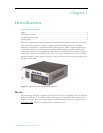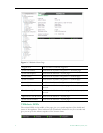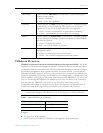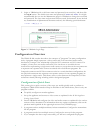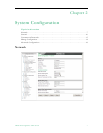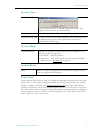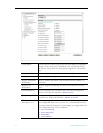
Introduction
VBrick H.264 Appliance Admin Guide 5
Video Configuration
On the Video/Audio Configuration pages you define the relationship between physical
audio/video connectors and audio/video sources and the relationship between audio/video
sources and the program. In most cases this is very simple because the hardware allows only
one set of relationships. For example, in this release, there is one video source which is, at any
point in time, either the Component or S-Video connector, one audio source which can be
either one of the audio jacks or both, and one program consisting of the audio source and/or
the video source.
Going forward, the software will query the hardware and offer appropriate programs. Note
that in some cases, the same video source may be associated with different programs. For
example, you may have a single video source associated with multiple audio sources in a
multi-language environment. Templates can be used to control a single video or a single
audio rate. Templates are part of the rate configuration for each audio or video source. The
Load Template button launches a pop-up window showing the available templates with
preconfigured values.
As noted above, in some cases there is not a one to one mapping between physical video
connectors and video sources. In this release, for example, you can use either the S-Video or
the Component connector as the source for the single program available. You can switch
between the connectors but the viewer will see the video stream adjusting in the program
they are viewing.
Audio Configuration
As noted, this release supports only a single mono or stereo audio source. If two physical
connectors are defined as being utilized for stereo, there will be one configuration for the
stereo pair. That is, the two physical connectors will represent a single audio program source.
The options shown in the dropdown box labeled
How is audio connected? define how the
audio connectors can be used. There is an Automatic Volume Control field that is enabled by
default. The first three options load preset values that cannot be changed unless you select
User Defined.
Program Configuration
The Program Configuration page has an area where all common parameters associated with
the program are defined. The most critical of these parameters is the announcement data (on
the Transmitters page) and the program name (on the Programs page). In order for the Portal
server to know that the various announcements being generated are associated with the same
program, the program name for all announcements for different delivery mechanisms and bit
rates for the given program must be the same.
Transmitters
There are up to 25 destinations available per program. Each is selectable as unicast or
multicast. The configuration parameters are divided into a common section (on the Programs
page) and another section (on the Transmitters page) which configures each individual
destination. The Announce IP Address for Transmitters and port provides the ability to
configure a single announce IP address and port for all multicast/unicast destinations. The
announcement for all configured destinations will be sent to this IP address and port.
The
Use Global Announce IP and Port option sends the announcement to the IP address and
port specified on the Common parameters page. Users are allowed to name the destinations.







